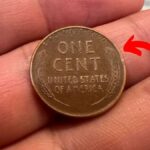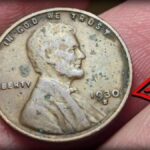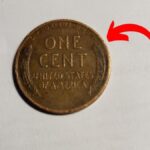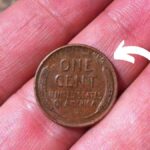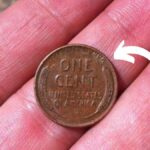The Lincoln Wheat Penny Valued at $400,000, Still in Circulation: When you think of valuable coins, pennies might not immediately come to mind. Yet hidden among the countless copper coins that have jingled in American pockets since 1909, some Lincoln Wheat Pennies hold astonishing value, with certain rare specimens worth up to $400,000. This remarkable story of numismatic treasure began over a century ago, when the U.S. Mint decided to honor Abraham Lincoln’s 100th birthday with a new penny design that would change American coinage forever.
Birth of an American Icon
In 1909, the Lincoln Wheat Penny made history as the first U.S. coin to feature a president’s likeness. Sculptor Victor David Brenner created the iconic design, featuring Lincoln’s dignified profile on the front and two elegant wheat stalks on the reverse, symbolizing America’s agricultural abundance. This design would grace American pennies for nearly fifty years, becoming one of the most recognized pieces of currency in U.S. history.
The Rarity Factor
What makes certain Lincoln Wheat Pennies so valuable isn’t just their age – it’s their scarcity. The 1909-S VDB penny stands as a prime example. Only 484,000 of these coins were minted bearing Brenner’s initials (VDB) at the San Francisco Mint before the initials were removed due to controversy over their prominence. This relatively small mintage, combined with historical significance, has made these pennies highly prized by collectors.
The Wartime Wonder
Perhaps no Lincoln Wheat Penny captures the imagination quite like the 1943 copper penny. During World War II, copper was needed for the war effort, leading the Mint to switch to steel pennies. However, a few copper blanks from 1942 accidentally made their way into the 1943 production line. These rare copper pennies, never meant to exist, are now among the most valuable coins in American history, with some specimens selling for hundreds of thousands of dollars.
Errors That Made History
Sometimes mistakes can be incredibly valuable. The 1922 “No D” penny resulted from worn dies at the Denver Mint, causing some coins to be struck without the distinctive “D” mint mark. What might seem like a simple oversight has created one of the most sought-after variations in the series. Other valuable errors include double-die strikes, where design elements appear doubled due to misaligned dies during minting.
The Condition Question
For collectors and investors, condition is paramount. A Lincoln Wheat Penny in pristine, uncirculated condition can be worth significantly more than the same coin showing wear. Professional grading services like PCGS and NGC evaluate coins on a 70-point scale, with mint state (MS) coins commanding the highest prices. The difference between a well-worn example and a pristine specimen can be thousands of dollars.
Hunting for Treasure
For those interested in searching for valuable Lincoln Wheat Pennies, knowing what to look for is crucial. The mint mark, located beneath the date, can be a key indicator of value. Pennies from San Francisco (S) and Denver (D) are often rarer than those from Philadelphia (no mint mark). Key dates like 1909-S VDB, 1922 No D, and 1943 copper pennies deserve special attention, as do coins showing unusual errors or exceptional preservation.
The Science of Authentication
Determining whether a Lincoln Wheat Penny is genuine requires both knowledge and tools. For 1943 pennies, a simple magnet test can help – genuine copper specimens won’t stick to a magnet, while the common steel versions will. However, professional authentication is crucial for potentially valuable specimens, as sophisticated counterfeits exist. Professional grading services employ advanced technology and expert knowledge to verify authenticity.
Preservation: Protecting Your Investment
Proper storage and handling are essential for maintaining a coin’s value. Experts recommend using acid-free holders and never cleaning old coins, as improper cleaning can significantly reduce their worth. Coins should be handled by their edges while wearing cotton gloves to prevent skin oils from causing damage. Storage should be in a controlled environment, away from temperature extremes and humidity.
The Historical Significance
Beyond their monetary value, Lincoln Wheat Pennies tell the story of America through the 20th century. They witnessed two world wars, the Great Depression, and the dawn of the atomic age. The 1943 steel pennies, in particular, represent American resourcefulness during wartime, while the entire series reflects the evolution of U.S. currency and collecting.
A Modern Legacy
Though the wheat design was replaced by the Lincoln Memorial reverse in 1959, the Lincoln Wheat Penny’s influence endures. Today’s collectors appreciate these coins not just for their potential value but as tangible connections to American history. Every worn wheat penny represents countless transactions, passing through numerous hands during some of the most significant moments in our nation’s past.
Looking to the Future
As time passes, truly exceptional examples of Lincoln Wheat Pennies become increasingly scarce, potentially driving values even higher. While finding a $400,000 penny might be a long shot, the hunt itself connects modern collectors to a fascinating chapter in American numismatic history. Whether you’re a serious collector or simply curious about old coins, the story of the Lincoln Wheat Penny reminds us that extraordinary value can sometimes be found in the most ordinary places.

